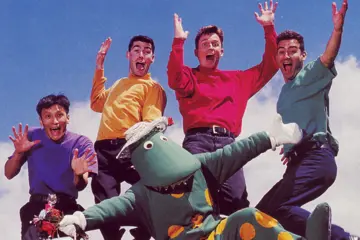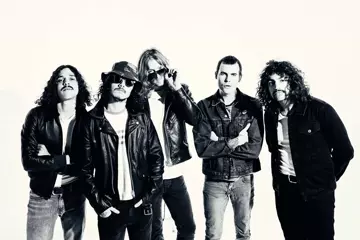 Delta Goodrem
Delta GoodremIt’s just the beginning.
That’s how I started the bio for Delta Goodrem’s debut album, Innocent Eyes, which was released on March 24, 2003.
Twenty years ago, in the early days of the internet, the “bio” was the piece of paper that accompanied the CD when it was sent to the media.
When a friend at Sony asked if I’d like to write some words about Delta’s debut, I’d heard just two of her songs: her now-forgotten first single, I Don’t Care, which, despite being co-written by Aussie hitmaker Steve Kipner (Physical, Genie In A Bottle), was not a success, peaking at #64. At the time, record companies were trying to create Britney clones.
Two years after I Don’t Care, Delta delivered Born To Try. Released two days after her 18th birthday, it entered the charts at number three. A week later, it hit number two. Then, a week after that, it reached the summit.
Don't miss a beat with our FREE daily newsletter
“Lyrically, it sums me up,” Delta said of her first chart-topper. “I might not have been born to win, but I wasn’t born to lose. I was born to give it a good shot.”
The biggest challenge of writing a bio for a record company is tempering the label and artist’s enthusiasm to call their work the greatest record since Sgt. Pepper’s. My approach is simply to try to capture the reader’s attention. Hopefully they’ll be interested enough to give the record a spin and then they can make up their own mind.
If the music is good, there’s no need to say it.
And Delta’s music was good.
I found my old notebook the other day. In it I’d scribbled my first impressions of the album. A couple of sentences leapt out:
She’s like Tori Amos, but more pop. Can’t believe she’s only 18.
I met Delta at a little studio in North Melbourne. It was a Saturday – Delta’s day off from shooting Neighbours, where she was playing singing schoolgirl Nina Tucker.
Our interview was also being filmed. The plan was simple: Delta would play a song on the piano and then we’d chat about it. I remember saying to a friend that I’d be home in a couple of hours. I mean, she’s only 18, how much can she have to say?
Seven hours later, we were still chatting.
I wish I could dish some Delta dirt from our bio chat, but there were no diva-like demands. Hell, I recall we didn’t even take a break for lunch. By the end of the day, I was getting hangry, but Delta’s demeanour didn’t change – she was a delight from start to finish and could not have been easier to work with.
The next time I saw Delta was at the Logies. The thing that struck me was the following morning, when most stars were nursing nasty hangovers or still trying to find their way back to their hotel rooms, Delta was doing a string of interviews on breakfast radio.
“It’s just the beginning” – the line that Delta repeated several times during our chat – was more than just a saying for this artist. Perhaps spooked by the failure of her debut single, she knew that most pop careers didn’t progress beyond the beginning. She was determined to build a lasting career.
As she sang in Born To Try, “No point in talking what you should have been/ And regretting the things that went on/ Life’s full of mistakes, destinies and fate/ Remove the clouds, look at the bigger picture.”
I’d never seen someone work so hard, and I often wonder if it took a toll on her health.
Delta captured the craziness in the piano ballad In My Own Time, singing: “So much is happening to me … my head is spinning around and it’s making me dizzy.”
An Australian artist has never had a year quite like Delta’s 2003. She packed a lifetime into just one album.
Unprecedented success: Innocent Eyes spent 29 weeks at number one, breaking John Farnham’s Whispering Jack record of 25 weeks. All five singles – Born To Try, Lost Without You, Innocent Eyes, Not Me, Not I and Predictable – went to number one. The album sold 1.2 million copies in Australia – second only to Whispering Jack for a local release. It won Highest Selling Album two years in a row at the ARIA Awards.
A health battle: Three months after the album was released, Delta was diagnosed with Hodgkin’s lymphoma. She underwent chemotherapy and radiation treatment.
Management issues: In August 2003, Delta sacked her manager Glenn Wheatley, and her mother, Lea, took over. “Here is a statement regarding my management,” Delta posted on her website. “I am grateful for the work that Glenn has put into my career. However, there have been life-changing experiences for me, and my wishes are that while I spend time to concentrate on my recovery, I have the time to reassess my life and how I see my future.”
Multiple awards: In October, Delta won seven ARIA Awards – a record for a female artist – including Single of the Year and Best Female Artist. Awkwardly, Wheatley was seated in front of the stage as his remaining client, John Farnham, was being inducted into the Hall of Fame. As Delta was too unwell to perform, Darren Hayes sang Lost Without You to celebrate her success.
Legal dramas: The producers with whom Delta had worked before making Innocent Eyes threatened to release her early recordings. And Mark Holden, who had worked for Sony as a consultant, discovering Delta’s demo tape, threatened to sue the label for unpaid consultancy fees. Both cases were settled out of court.
Still a teenager, Delta learned a brutal music maxim:
Where there’s a hit, there’s a writ.
It was the end of the innocence.
As Delta presciently put it in My Big Mistake: “How could something so magic, magic become something so tragic, tragic?”
I hadn’t listened to Innocent Eyes in a long time. But I played it the other day and it took me back to that Saturday at the start of 2003. It might be a song or two too long, but it still sounds fresh and exciting.
Back then, I called it a pop album full of surprises.
When I asked Delta about her favourite artists, she listed Silverchair, Incubus, Jeff Buckley and “the Diva Girls” – Mariah and Celine. Innocent Eyes never really rocks, but it was more interesting and diverse than the rest of the pop albums that were dominating the airwaves in 2003.
“Running away from predictable, Miss Reliable, so methodical,” Delta sang. “Be individual, an original.”
Delta worked on the album with an amazing array of people, including the True North production and songwriting team (Take That’s Gary Barlow, Eliot Kennedy and Tim Woodcock), her Born To Try co-writer Audius, producer Ric Wake (Celine Dion, Jennifer Lopez and Mariah Carey), Matthew Gerrard (Kelly Clarkson, Hilary Duff), David Nicholas (INXS, Elton John, George), Vince Pizzinga (Danielle Spencer), Mark Holden and American producer John Fields, whose uncle Steve Greenberg wrote Funky Town.
But despite the cavalcade of collaborators, the record never felt overcooked. To my ears, it still sounds like a young woman’s journey.
“I wanted to make an album that reflected me at this time in my life,” Delta explained. “Every song takes me to a place where I can remember what happened.”
She wrote This Is Not Me when she was struggling to find her direction, A Year Ago Today was for her Aunty Sandra who died of cancer, while Not Me, Not I documented her first heartbreak (believed to be her Neighbours co-star Blair McDonough).
And the title track is a song about daring to dream.
“Do you remember when you were 15,” Delta sings. “And the kids at school called you a fool because you took the chance to dream?”
“The song is about looking at the world with innocent eyes, that enthusiasm,” Delta said, “which I never want to lose.”
Looking back at old bios can be cringeworthy. The hyperbole is often embarrassing as you predict longevity for artists currently residing in the ‘Where Are They Now’ file. But with Delta, I’m proud to say I got it right (which, after hearing the album, was as outlandish as tipping that a P!nk tour is going to sell a stack of tickets). I wrote:
It’s an album that heralds the arrival of a major new talent. A career artist, who’s doing things her way.
Robert Forster wrote more eloquently about Delta in his book, The 10 Rules of Rock and Roll. He recognised she was a special talent but wondered whether the record company world would understand her.
“It comes down to the strange package Delta Goodrem actually is,” Forster wrote. “She is good looking, but not in a pocket-sized, push-up bra kind of way. She can sing, but it’s a powerful, ‘hit them in the back row’ voice. And she is a musician.
“So, she’s an oddity in the teenage-girl pop landscape. There is something old-fashioned and square about her, too, that must have the marketing people scratching their heads.
“What to do with her? Sexy? Windswept? Diva? Dance floor?
“Goodrem is ready, even if what gets lost along the way are some of the best things she has to offer.”
When Forster was promoting his book on ABC radio, he continued to muse about the young singer. I was so intrigued that the Go-Betweens legend had thought so deeply about Delta’s career, I took some notes.
“They [music executives] don’t know what to do with her,” he said.
“I find her a fascinating figure. I think Carole King and Laura Nyro, which is where she could go. I think she’s an intriguing, interesting person. If you asked me for the 10 best songs of the last decade from Australia, you’d have to put Born To Try in there. It’s a power ballad but a great song.”
It’s nuts that Born To Try didn’t become a hit in the US, though with the help of the Neighbours exposure, it rose to number three in the UK.
“I do have a lot of goals,” Delta said as we wrapped up our bio chat. “I want to take my music to people and tell my story, and one day be singing at the Grammys and the Brits and the ARIAs. Just world domination, I’m not asking for much.”
She laughed, before adding: “It’s just the beginning.”
Twenty years on, Innocent Eyes is still Delta’s finest record. It was the perfect debut album.
Yep, it was just the beginning. But what a beginning.
















